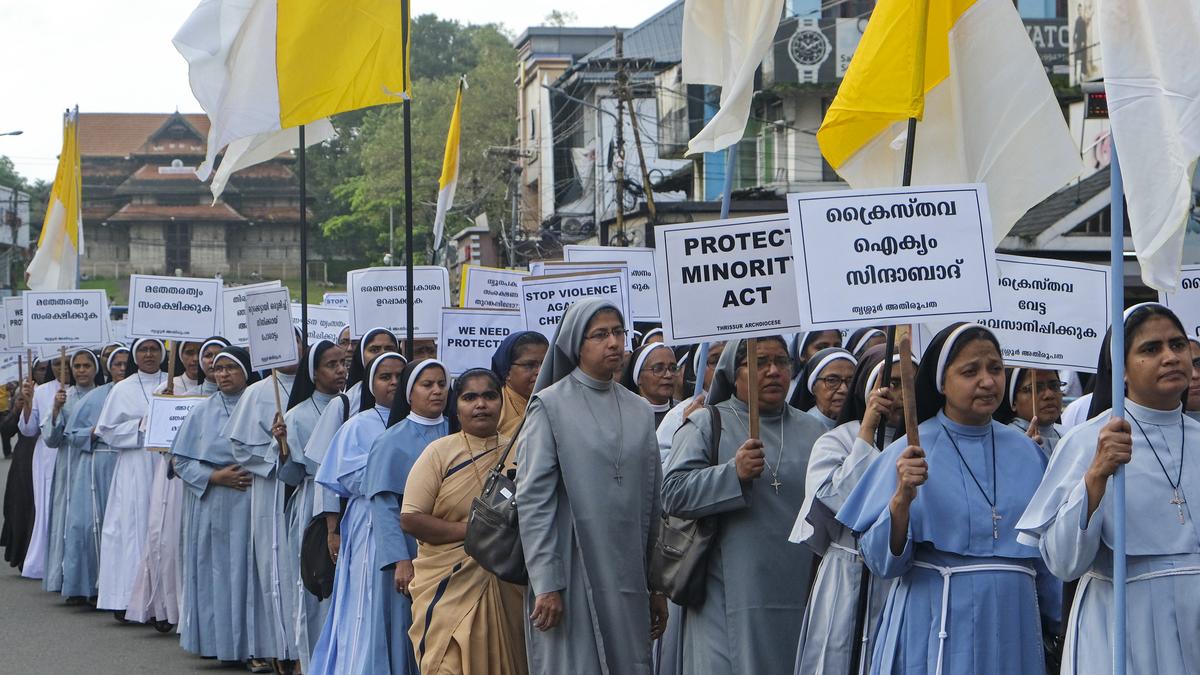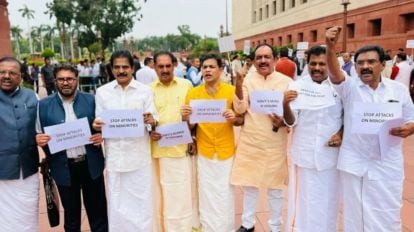On July 26, 2025, two Catholic nuns from the Kerala-based Assisi Sisters of Mary Immaculate (ASMI)—Sister Preeti Mary and Sister Vandana Francis—were arrested at Durg Railway Station in Chhattisgarh alongside a youth, Sukhman Mandavi, from Narayanpur district. They were accompanying three young tribal women, aged between 18 and 19, reportedly to Agra for domestic work. Despite the women being legal adults with valid identity documents and written parental consent, the nuns were charged under Section 143 of the Bharatiya Nyaya Sanhita (BNS) for trafficking and Section 4 of the Chhattisgarh Religious Freedom Act, 1968, for alleged forced religious conversions.
The arrests followed a mob intimidation led by Bajrang Dal activists, who protested vehemently against the group, accusing the nuns of forcibly converting the tribal women and trafficking them. The families of the three young women have denied any coercion or trafficking, stating they willingly consented for their daughters to take up employment opportunities. The police registered an FIR based on a complaint from a local Bajrang Dal activist. The incident has sparked widespread condemnation from Christian organizations and human rights groups as a targeted harassment under the guise of anti-conversion and trafficking laws.
Christian leaders and local church bodies have protested the arrests and alleged mistreatment of the nuns in custody, with videos circulating showing right-wing activists barging into the police station where the nuns and the youth were detained. Many political leaders and church representatives argue the charges lack evidence and that the arrests were made without preliminary inquiry. The Catholic Bishops Conference of India (CBCI) condemned the arrests as humiliating and questioned the relevance of minority rights protections in BJP-ruled states.
The legal battle surrounding the Catholic nuns, Sister Preeti Mary and Sister Vandana Francis, continues amid deepening political and communal tensions. Both originally from Kerala, the nuns were arrested along with a tribal youth, Sukhman Mandavi, at Durg Railway Station under charges of alleged human trafficking and forced religious conversions. Despite the families of the three young tribal women involved affirming their consent and legal adulthood, the Special Investigation Team and local police acted under pressure from right-wing groups like Bajrang Dal.
The nuns have been remanded to judicial custody until early August, with bail pleas denied by both the lower courts in Durg and later by the Sessions Court, which ruled that the case falls under the jurisdiction of the National Investigation Agency (NIA) court in Bilaspur. This prolongs their detention, intensifying calls from minority rights groups and opposition politicians for their immediate release.

Complex Legal and Political Fallout Amidst Mass Protests
The case has quickly escalated beyond a legal matter to a significant political flashpoint. The arrests have triggered protests across India, notably in Kerala, where the nuns hail from. Several delegations of Members of Parliament from the United Democratic Front (UDF) visited the jailed nuns in Chhattisgarh, demanding their immediate release. Meanwhile, a delegation from the ruling Left Democratic Front (LDF) was denied access, further intensifying tensions.
The Chhattisgarh sessions court recently rejected the nuns’ bail pleas, stating the special sections of the law invoked require trial in the designated National Investigation Agency (NIA) court in Bilaspur. The stringent legal framework has prolonged their detention despite public outcry and evidence of consent from the women’s families. The state government has defended its actions, citing ongoing investigations and the necessity to uphold anti-conversion laws intended to prevent forced religious conversions.
Opposition parties, including Congress, have accused the BJP-led state government of political targeting and creating a climate of fear against minorities. Congress MPs staged protests in parliament demanding the nuns’ release, alleging the charges are false and based on communal bias. The case has spotlighted wider debates about the misuse of anti-conversion laws in certain BJP-ruled states to harass religious minorities under pretexts such as trafficking.
Civil society groups have demanded an independent and transparent inquiry, protection for the nuns against vigilantism, and prompt legal justice. The arrestees are currently held at the Durg Government Railway Police (GRP) lock-up, coping with pressure from hostile right-wing groups.
Christian organizations and human rights advocates have fiercely condemned the arrests, labeling them as politically motivated and fabricated cases targeting religious minorities. The Conference of Religious India (CRI) issued a strong statement denouncing the unlawful detention, highlighting a growing pattern of persecution against marginalized communities, especially Christians, Dalits, and tribal peoples.
They note that similar cases involving allegations of conversion and trafficking have often lacked proper evidence and have been used to stoke communal divisions. Prominent leaders such as CPI(M)’s Brinda Karat and Congress MP Priyanka Gandhi have visited the detained nuns in jail, expressing shock at their condition and reporting signs of emotional trauma. Both leaders accused the Chhattisgarh state government and ruling party of orchestrating a narrow communal agenda that undermines constitutional protections of freedom of religion.

Human Rights Concerns and Minority Rights Under Severe Threat
This incident has raised alarm among human rights defenders who say it exemplifies the growing pattern of state-led and vigilante oppression against minority religious communities in India. The fact that the nuns were legally escorting consenting adults with valid documentation and parental permissions has not impeded their arrests and public vilification. Their detention amid aggressive protests by Bajrang Dal activists constitutes a grave violation of their rights and raises questions about police complicity.
Christian organizations contend that the Chhattisgarh Religious Freedom Act and similar anti-conversion laws are frequently used as tools of intimidation without sufficient proof, chilling the freedom to worship and work. The CBCI has called for the repeal of such laws and warned of rising communal tensions driven by these policies.
The arrest and ongoing detention also highlight the fragile status of tribal communities involved, whose voluntary choices are being questioned and undermined. Families of the three young women have repeatedly confirmed their consent, yet their voices have been sidelined in the legal process dominated by allegations and political pressure.
Religious minorities see this as a severe blow to constitutional rights, especially the guaranteed freedom of religion and the protective measures enshrined for vulnerable groups. The situation demands urgent intervention to protect fundamental rights and prevent the misuse of legal provisions.
The incident has sparked widespread public protests and political mobilization, especially in Kerala, where the nuns hail from. Delegations from Kerala’s United Democratic Front (UDF) and local Christian bodies have petitioned the Chhattisgarh government for fair treatment and immediate release. Social media platforms have amplified messages in support of the nuns and criticized the Bajrang Dal’s alleged role in intimidating the accused and their families.
Videos have surfaced showing mob violence and threats targeting the women and the nuns inside police stations, exacerbating fears over their safety. Yet, despite intense pressure, the Chhattisgarh government has maintained that judicial processes must run their course, resisting political calls for intervention, and defending the application of the Chhattisgarh Religious Freedom Act along with anti-trafficking laws as necessary for law enforcement.
Social Backlash and Polarization in Chhattisgarh and Beyond
Following the arrests, violent incidents and mob clashes erupted near police stations in Durg, where right-wing groups demanded severe punishment of the nuns and associates. Videos captured mobs confronting police officials and chanting slogans that echoed communal hatred, exacerbating social divisions.
This case has become a rallying point for various religious and political factions, with social media amplifying polarized narratives. Supporters of the nuns campaign for their release, while opponents frame the incident as a victory against what they call “illegal conversions.” The charged atmosphere in Chhattisgarh reflects broader national controversies surrounding religious conversions and minority rights.
The incident has also drawn criticism from various political and human rights leaders within and outside the state who warn of the dangerous precedent set by such arrests in the absence of substantive evidence. Calls for protecting minorities from extrajudicial harassment have grown louder, with demands for impartial investigations into such cases.

The broader societal and political context reveals that the arrests encapsulate the rising tensions in BJP-ruled states over religious conversions and minority rights. The local complaint came from Bajrang Dal activists who alleged forcible conversions disguised as missionary work. However, evidence gathered so far indicates the young women were willing participants, traveling with parental consent for legitimate employment.
The case has reignited debates on the misuse of anti-conversion laws, which critics say often serve as tools for majority intimidation rather than genuine legal protection. It also highlights how tribal communities remain particularly vulnerable to social and political pressures, caught between traditional norms, economic opportunities, and the politics of identity and religion.
Conclusion: Demand for Justice, Fair Treatment, and Legal Reforms
The arrest of Catholic nuns Preeti Mary and Vandana Francis in Chhattisgarh has underscored deep tensions in India’s religious and social fabric. While state authorities claim to enforce anti-conversion and trafficking laws, the families’ denials and lack of concrete evidence suggest the case is fraught with communal undertones and political ramifications. The nuns’ continued detention amid hostile public sentiment raises serious human rights questions.
This case demands urgent and transparent legal scrutiny respectful of constitutional guarantees, alongside measures to protect vulnerable minorities from targeted harassment. The ongoing protests and political interventions signal widespread unease over the misuse of laws designed to protect but often weaponized against minority communities.
Ultimately, the incident calls for balanced reforms that safeguard religious freedom and consent-based choices, while preventing actual trafficking and exploitation. The nation watches as this case unfolds, hoping justice will prevail over communal bias and minority rights will be upheld in accordance with India’s democratic principles.
Follow: Kerala Government
Also read: Home | Channel 6 Network – Latest News, Breaking Updates: Politics, Business, Tech & More

